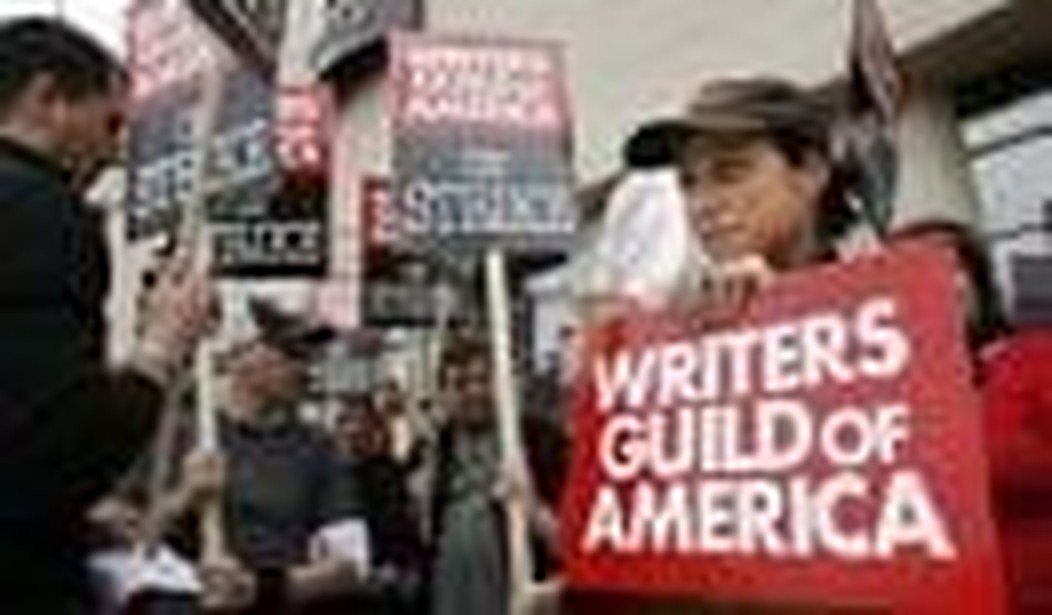The dream that each of us will some day get our “piece of the pie” is as American as apple pie. But, like everything else in life, there’s a catch. We must earn our slices again and again by keeping customers satisfied in an economy marked by constant change and innovation. As striking Hollywood workers seek their piece of the pie of online revenues, that’s the hard lesson they will soon have to swallow — and, it is not going to go down easy.
In the 20th century, Big Labor had its own special recipe – it called for a very big pie that fed millions. The key ingredient was a large, dependable flow of cash from hungry, mass audiences who were starved for a product. The “suits” at the mega corporations were expected to grab for the biggest piece they could get away with. The little guy responded by organizing into bigger units, the labor union, which pushed back with strikes and other actions to get the workingman his fair share.
As expected, that’s the script that unionized Hollywood writers are now following. On paper, these creative individuals, many of them freelancers, do not lead the most secure lives. Their fortunes can rise and fall with the success of their projects. So, they banded together into a bigger unit, a labor union, that could push back producers to provide them with a financial package that delivered some level of security. Typically, this recipe calls for accepting less money upfront with the hope of making it up later in residuals when the work moves into syndication and other uses.
This seemed reasonable, as writers had until recently had every reason to believe that this balance of pie-power involving mass audiences, big producers, and big labor would go on forever — particularly because the mass audience was a captive audience. Because of FCC regulations, viewers could only receive 3-4 TV networks in their local markets. These networks had seemingly eternal, guaranteed, stable cashflows to meet the demands of Hollywood talent because government had given them the gift of scarce and valuable broadcasting licenses. Similar dynamics appeared in the film industry, where the economics of geographically-disbursed theater chains favored limited numbers of expensively produced, mass appeal blockbusters.
Over time, flaws did become evident in the recipe, but they went largely unnoticed. Artificially high union wages, overly-protective child labor laws, and other costly work rules imposed by labor unions on the entertainment industry were beginning to send film companies scurrying out of California to other states and countries for production and editing. Also, networks slowly began replacing their programming with content requiring fewer Hollywood resources — first with the influx of newsmagazines like Dateline and 20/20, then with more games shows, and now with a new wave of reality shows. Still, nothing was done to address these issues which made Hollywood less competitive, partly because Hollywood workers were still making plenty of money, and partly because no one dared to challenge those at the top of the food chain who occasionally took production elsewhere.
But suddenly, digital technology has been thrown into the mix, and the recipe for the pie has changed. For one thing, the masses that once starved for fresh Hollywood entertainment programs now have plenty to eat. They can now gorge themselves on a full buffet of video choices, far beyond Hollywood’s relatively limited fare. Screens will no longer go blank when writers strike — alternative content on the Internet, DVD’s, and video games offer a nearly unlimited amount of entertainment, much of which consumers will no doubt discover, sample, and enjoy during a prolonged strike.
But, the biggest threat to the ability of writers to put food on their tables is the Internet. Still following the old script, Hollywood writers simply assume producers’ refusal to guarantee them a slice of the online programming pie is just a tactic to keep a bigger piece for themselves. Not so. All forms of media are now converging to the Internet, which ultimately will be the single medium for virtually all content. Networks are scrambling to move all of their content to the web where, for the first time, they will face stiff competition against multitudes of content providers. This means that the previous high levels of network ad revenues are no longer guaranteed. And, that’s why former Disney head Michael Eisner eloquently called the strike “stupid,” while noting that only Apple CEO Steve Jobs has even identified a business model, iTunes, that generates Hollywood-level profits from digital content and distribution.
So, writers are now striking for a guaranteed slice of a pie that producers are not sure will exist, much less how many it can serve. For Hollywood, this is a recipe for disaster.
Steve Boriss blogs at The Future of News. He works for Washington University in St. Louis, where he is Associate Director of the Center for the Application of Information Technology (CAIT) and teaches a class called “The Future of News.”









Join the conversation as a VIP Member